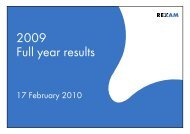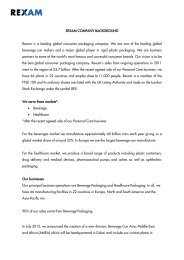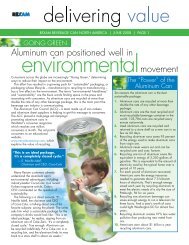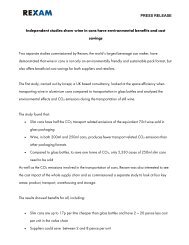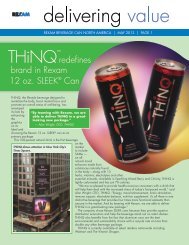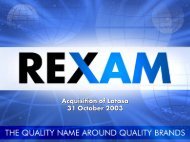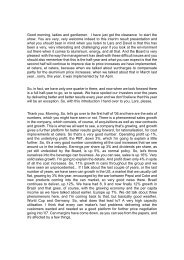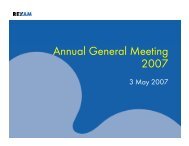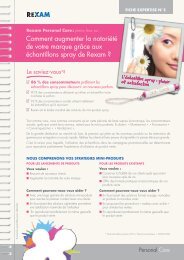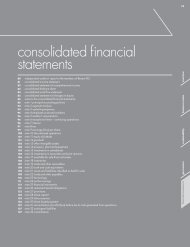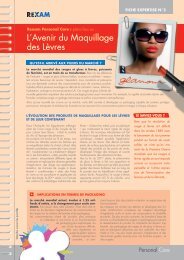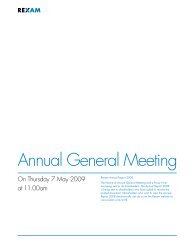All case studies
All case studies
All case studies
Create successful ePaper yourself
Turn your PDF publications into a flip-book with our unique Google optimized e-Paper software.
35 billion used aluminium beverage cans. Of<br />
its global facilities, six are devoted to<br />
recycling post-consumer aluminium as well as<br />
scrap aluminium generated during the<br />
manufacturing process. This recycled metal is<br />
then utilized by Novelis’ own rolling facilities<br />
to produce can sheet –- an economical and<br />
efficient process. This process can continue in<br />
an endless loop, because aluminium maintains<br />
its original quality through the recycling<br />
process and re-use.<br />
Novelis has implemented and supports<br />
recycling programs directly or through<br />
associations in various countries:<br />
• In Brazil, Novelis has assumed a leadership<br />
role to increase the region’s acceptance<br />
of aluminium cans and the environmental<br />
and social benefits of recycling through<br />
educational programs on the advantages<br />
of aluminium recycling, and collaborated<br />
with some 300 schools in doing so.<br />
• Novelis is the leading aluminium can<br />
recycler in Europe. They operateEurope’s<br />
only dedicated UBC plant which produces<br />
new can sheet material. They recycle cans<br />
and are actively involved in education and<br />
awareness activities right across the<br />
continent.<br />
• Novelis sponsors America Recycles Day;<br />
The Cans For Cash program co-sponsored<br />
with the U.S. Conference of Mayors; an<br />
active member and supporter of Cans for<br />
Habitat program; and The Aluminium Can<br />
Council Curbside Value Partnership (CVP),<br />
a national partnership between the aluminium<br />
industry and material recovery facility<br />
(MRF) operators, local officials and<br />
organizations interested in recycling.<br />
Aluminium produced from scrap requires 95<br />
percent less energy than is needed to produce<br />
primary aluminium – which means that up to<br />
95 percent of related emissions such as<br />
greenhouse gases are also avoided. Reductions<br />
of that magnitude take on added significance<br />
at a time of increased concerns about climate<br />
change and its associated impacts on<br />
biodiversity.<br />
Specifically, here are some of the environmental<br />
impacts avoided through recycling:<br />
• 95% energy savings<br />
• Greenhouse gas emissions avoided –<br />
tonne of recycled aluminium avoids<br />
emissions of approx. 0 tonnes of CO<br />
• Reduced use of natural resources<br />
• Chemical use reduced (acids, bases)<br />
– 50 kg of caustic soda – 8 kg of<br />
aluminium fluoride – 86 kg of lime<br />
• tonne of recycled metal eliminates the<br />
need for 5 tonnes of bauxite, thus<br />
eliminating the need for more mining<br />
• tonne of recycled aluminium eliminates<br />
the generation of nearly tonnes of red<br />
mud, eliminating the need for red mud<br />
treatment in ponds/impounds reducing the<br />
overall processes impact on biodiversity<br />
• Recycling minimizes the overall impact on<br />
biodiversity<br />
3. External Stakeholder Requirements<br />
Novelis is committed to compliance with<br />
policy mandates, legal requirements and<br />
local stakeholder needs related to biodiversity<br />
such as:<br />
• Emission regulations (air, water, landfill)<br />
• Wetlands protection legislation<br />
• Navigable water protection<br />
ENVIRONMENT, BIODIVERSITY<br />
• Acquisitions and divestiture process – A<br />
responsible approach that assures<br />
biodiversity issues are addressed during<br />
acquisitions and divestitures (going beyond<br />
compliance with the law)<br />
4. Novelis Bauxite Mine Rehabilitation<br />
Program<br />
This includes:<br />
• Top Soil Management – Valuable organic<br />
top soils are collected and stockpiled prior<br />
to the mining operation<br />
• Species collection, transport and<br />
propagation – Native seeds and sprouts<br />
are selected based on indigenous flora<br />
analysis – Seeds and sprouts are<br />
transported to nurseries that have been<br />
specially designed for developing these<br />
native seeds and sprouts – Plants are<br />
monitoring in the nurseries during the<br />
growing season<br />
• Re-vegetation through inclusion of the<br />
collected species in reforested areas –<br />
Stockpiled top soil is distributed – Native<br />
plants are replanted in areas to be<br />
rehabilitated<br />
• Monitoring program – Replanted areas are<br />
monitored for survival rate, growth and<br />
spread during the rehabilitation process<br />
and action is taken wherever necessary.<br />
For more information on Novelis’s biodiversity and other environmental programmes, please visit<br />
their website at www.novelis.com.



